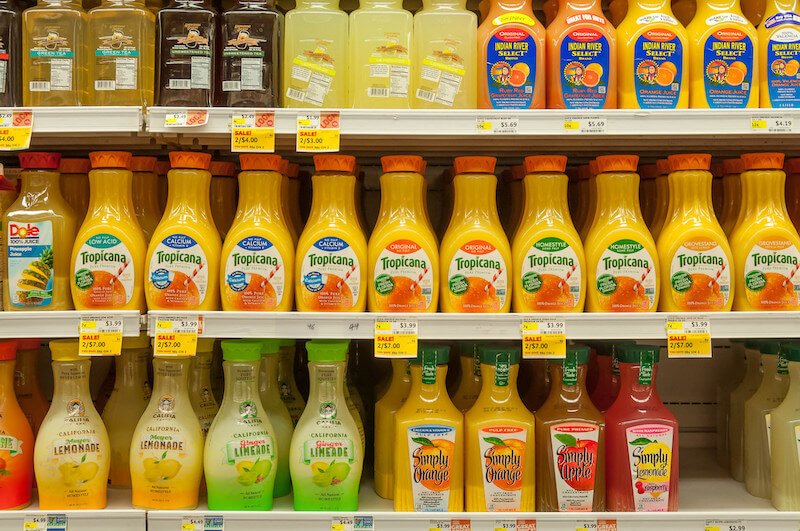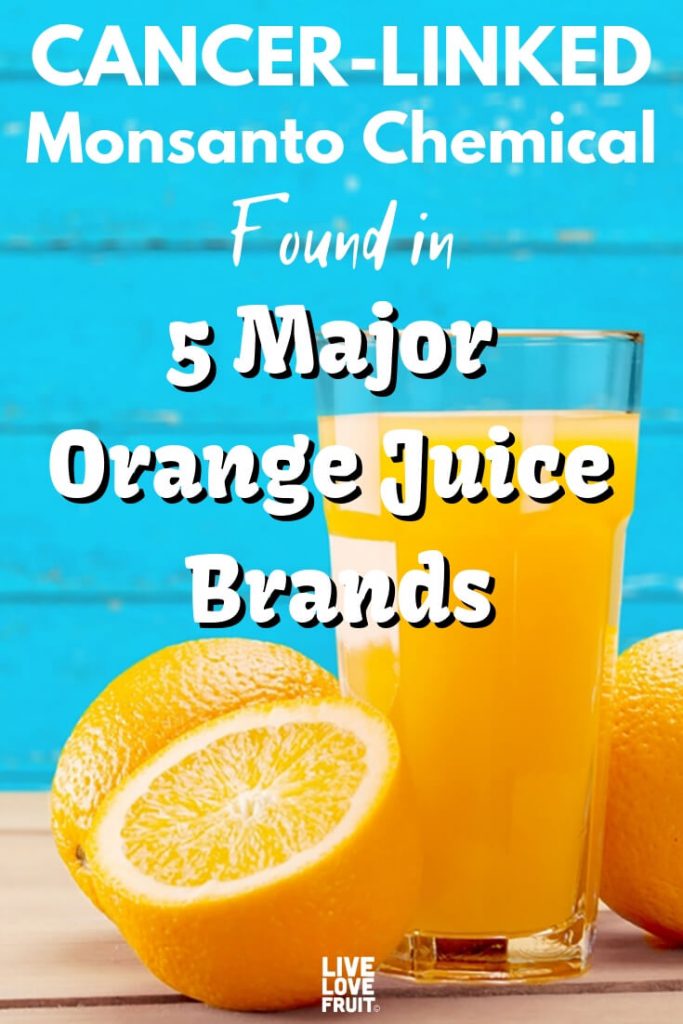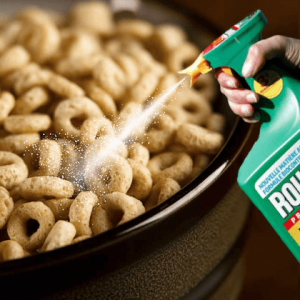
Enjoying a glass of orange juice with breakfast is something Americans have been doing for decades. Not only is it refreshing, but it infuses the body with beneficial vitamin C, fiber and other antioxidants.
However, this only holds true if you’re sourcing your orange juice from a trusted supplier. Recently, five popular orange juice brands have come under scrutiny for having tested positive for a popular cancer-causing weedkiller, one we’ve become quite familiar with over the years: glyphosate.
It might seem odd that you’d find residues of glyphosate in orange juice, but given the fact that over 3,200,000 pounds of glyphosate is sprayed on orange crops annually, it starts making a little more sense.
But what makes glyphosate so harmful? Aside from being a cancer-trigger, glyphosate does some pretty nasty stuff to our gut microbiome. As a result, our bodies have become nutrient deficient, which has led to compromised immune systems and a chronic diseased state.
How Glyphosate Affects our Microbiome
In recent years, science has started to shed light on how important our gut microbiome is to our entire system of well-being. It is so important, that it has even been compared with a ‘second genome’ due to its significant effects on just about ever aspect of human health.
The interesting thing, too, is that our gut microbiota isn’t the same for each individual. The composition of good and bad bacteria in our guts can greatly change over a lifetime in response to diet, overall health, antibiotic exposure, and more (1).
A thing called gut dysbiosis happens when beneficial bacterial strains decrease, and pathogenic strains (and following inflammatory response) increases. Inflammatory states associated with gut dysbiosis leads to decreased integrity between epithelial cell junctions, making the barrier ‘leaky’ and creating a loop by impairing nutrient uptake and pathogen defense (2). This is what we like to call leaky gut syndrome.
Leaky gut has been linked to many negative health effects including inflammatory bowel disease, chronic inflammatory conditions (like arthritis), allergies, to things like celiac disease.
So how does this all tie in to glyphosate? Glyphosate destroys our gut microbiome. If you don’t already know, glyphosate has long been known to have antibiotic function through its inhibition of enolpyruvylshikimate-3-phosphate synthase (3). Several studies have also shown that glyphosate targets our beneficial bacteria over those bacteria considered to be pathogenic (which hurts us, more than helps us).
A study by Shehata and colleagues found over 50 times greater tolerance to glyphosate in disease-causing Clostridium species than that in Bifidobacteria species considered to be largely beneficial (4). Glyphosate may also indirectly lead to increases in pathogenic bacteria as demonstrated in a study published in Anaerobe. Researchers found that exposure to glyphosate concentrations that do not inhibit Clostridium growth was associated with a decrease in Enterococcus-derived inhibition of Clostridial production of toxins, such as botulinum (5).
In a review called Glyphosate-based herbicides and cancer risk: a post-IARC decision review of potential mechanisms, policy and avenues of research, the authors point out that “Although most inhibitory concentrations appear to be well above regulatory limits, differential sensitivity, and the multifactorial nature of microbiome composition stability, could mean a dysbiosis that favors increased risk of inflammation and potential carcinogenicity.” They then go on to note that “As longer studies are completed, it will be interesting to determine whether these short-term effects measurable impact long-term health outcomes.”
While the research is only just emerging on glyphosate and its relation to our gut microbiome, the results aren’t very comforting. Doing our best to avoid this chemical in our food is one of the most important things we can do for our health.
Glyphosate in Orange Juice
The grassroots non-profit Moms Across America recently made waves with an announcement that cause the attention of orange juice drinkers worldwide: samples of five major U.S. orange juice brands tested positive for glyphosate.
The chemical, deemed by the World Health Organization as a “probable carcinogen to humans” was found in amounts ranging from 4.43 parts per billion (ppb) to 26.05 ppb by the group’s tests.
It is important to note here that research has shown that as little as 0.1 ppb of glyphosateis capable of destroying beneficial gut bacteria (6). And as outlined above, this isn’t good news for our health. The result is a weakened immune system, and the tidal wave of health complications that arise as a by-product of this suppressed state.
The five major brands that tested positive according to lab tests were as follows (source):
1. Tropicana: 26.05 ppb and 25.12 ppb in glyphosate residues. Both samples were purchased from Target stores.
2. Minute Maid: 13.54 and 12.65 ppb, purchased from Jack in the Box stores.
3. Stater Bros: 4.93 and 4.43 ppb, purchased at Stater Bros.
4. Signature Farms: 6.33 and 5.78 ppb, purchased at Vons stores.
5. Kirkland Brand: 5.96 and 4.33 ppb, purchased at Costco stores.
Not Just Herbicides
In addition to glyphosate, orange juice (and other fruit juice) companies may contain synthetic additives including synthetic vitamins (in an attempt to make up for those lost due to processing and pasteurization), as well as “flavor packs” that are not required to be labelled on the ingredient list.
Companies like Simply Orange and Tropicana have actually been sued over these chemically enhanced flavor packs that are used to ensure the flavoring across different orange juice batches taste identical to one another.
Gizmodo explains part of the process:
Once the juice is squeezed and stored in gigantic vats, they start removing oxygen. Why? Because removing oxygen from the juice allows the liquid to keep for up to a year without spoiling. But! Removing that oxygen also removes the natural flavors of oranges. Yeah, it’s all backwards. So in order to have OJ actually taste like oranges, drink companies hire flavor and fragrance companies, the same ones that make perfumes for Dior, to create these “flavor packs” to make juice taste like, well, juice again.
Since the flavor packs are made from orange byproducts, companies don’t have to consider them an ingredient (so they are therefore not required to appear on food labels). This is despite the fact that the juices are chemically altered.
Considering that organic alternatives like Uncle Matt’s are widely available, it’s probably a better idea to spend a little extra in order to avoid these sneaky ingredient additions, as well as glyphosate.
Alternative Orange Juice Brands That Are Safe and Taste Delicious
If you’re a little pet-peeved that glyphosate has ended up in some of your favorite orange juice brands, you don’t need to worry. There are many other, and much safer brands out there that you can drink to your hearts content.
And while you can buy your own organic orange juice, please remember that fresh-pressed is always best (and probably even cheaper!).
Here are 5 delicious organic orange juice brands you can purchase today:
– Uncle Matt’s Organic Orange Juice
– Happy Planet Organic Valencia Orange Juice
– 365 Organic Orange Juice
– Evolution Fresh Organic Orange Juice
– Lakewood Organic Pure Orange Juice









Was this found in organic brands of Tropicana?
I don’t believe organic varieties were tested, but they would for sure be much lower (as most organic products are found with no or very little amounts of glyphosate from cross-contamination through air or water).
It is interesting to note that the levels noted would have been undetectable 30 years ago and therefore listed as zero.
Another interesting note is that glyphosate has only been around I think since the late seventies and , as a citrus grower we were told that it does not stay in the soil. There are studies now that indicate that it in fact does stay in the soil. We do not spray it directly on the tree so the only way for it to be in juice is to be taken up by the roots. I believe that this has been misdiagnosed as HLB, the greening disease that is now being blamed for the decline in citrus production in Florida